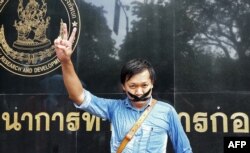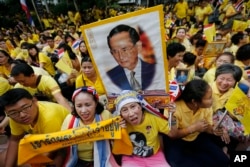Thai journalist Pravit Rojanaphruk was supposed to be in Helsinki now, at the invitation of Finland's government for the World Press Freedom Day celebration. But the kingdom's military junta, which seized power in a bloodless coup two years ago this month, barred the veteran reporter from leaving Thailand to attend the May 3 event, co-hosted by the United Nations' cultural arm, UNESCO.
“It couldn't be more ironic,” said Pravit, a senior staff writer for the online Khaosod English news site.
Thai junta officials contend Pravit has not learned his lesson after two sessions in detention for what they call “attitude adjustment.”
Pravit said he was told his trip was being blocked because he still keeps posting what they describe as attacks on the work of the National Council for Peace Order (the junta's formal name in English).
Army Colonel Piyapong Klinpan, the chief of the NCPO public relations center, confirmed to VOA Monday that Pravit has been barred from traveling to Finland, but said “I do not have the power to tell you why.”
Pravit explained to VOA that since he was first taken into custody by the military nearly two years ago, he was compelled to sign a “memorandum of understanding, which stated in part if I wished to travel outside the kingdom I had to seek their permission first.”
Finland's ambassador to Thailand, Kristi Westphalen, in a statement said it is “very regrettable” Pravit, who spent 23 years at The Nation - an English-language daily in Bangkok - was barred from attending the event in her country's capital.
Pravit was invited because he is “a well-known defender of liberty of expression and press freedom,” according to Finnish government officials.
EU: 'Ease off'
Ambassadors of the European Union member states recently called on the junta to allow Thais to have freedom of movement and expression.
EU nations, in a joint statement, expressed hope that Thailand, as a U.N. member and a key international partner, “abides by its international obligations.”
For journalists operating in Thailand, such as Pravit, it is difficult to figure out where is the line not to cross thus they engage in self-censorship to avoid detention.
“It's blurry. Nobody knows the line. I think it's up to those people running the military regime,” Pravit said. “Probably you know when you've crossed the line you get detained without charge by the military regime. And that's what happened to me twice.”
Thailand's military government is somewhat restrained compared to more notorious regimes in how it treats journalists whose reporting offends them.
“They are rather tactful repressive military regime,” as Pravit characterized the situation. “I hope that the world doesn't forget that no matter how tactful it is what's happening here in Thailand it's still nonetheless a form of censorship – not just on the press but on any citizens who wish to express any critical views of the military regime.”
Some editors believe the military will control the media for the long haul, unlike what occurred after numerous coups in the past when the generals handed power back to civilians in a relatively quick manner.
“Whether it's a direct role or not, the fact is the military has traditionally always played a role in Thai political history going back centuries, if not recent decades. That hasn't fundamentally changed, it's just the level,” said Pichai Chuensuksawadi, editor-in-chief of the Bangkok Post. “I'm not saying that's good. We would rather have a more transparent, open democratic system.”
Restraints are nothing new
Pressure on Thailand's media has also been applied by previous non-military leaders as well, including the civilian government led by Thaksin Shinawatra, who was ousted as prime minister in a 2006 coup and now considered a fugitive by the current junta.
“We've had problems with democratically-elected governments who have tried to pressure us through the commercial side,” Pichai told VOA.
A prevailing theory as to a major reason why this military government is likely to remain in place for years is another subject taboo for Thai domestic media to discuss.
The military and the elite want to ensure stability during the inevitable period of monarchical succession, according to conversations with several prominent figures in Thai society who do not want to be quoted for attribution.
Highly revered King Bhumibol Adulyadej is 88 and has been in poor health for years. The heir apparent, Crown Prince Maha Vajiralongkorn, 63, has not attained the exalted level of adoration given to his father.
Longstanding draconian laws forbid criticism of the monarchy and what denotes criticism can be broadly interpreted, compelling journalists - Thai and foreigners alike - to choose language carefully when referring to the Chakri dynasty, which has ruled since the late 18th century.
“It's been used as a political tool. It's too easy to file a lese majeste case. Anybody can do so and abuse it,” said Pichai at the Bangkok Post. “We believe it should be reformed. This is the position we've taken. This is the position we have written about. This is the position we have reported on.”
The Foreign Correspondents' Club of Thailand is scheduled to host four Thai journalists Tuesday to discuss how they deal with the pressure of working under a military government. The FCCT is one of the few organizations in the country that has attempted to host open discussion of a wide range of domestic and regional issues since the May 2014 coup.
The junta, however, has blocked several previous events at the FCCT from proceeding.
“The FCCT has always tried to be a place of open, constructive and civilized discussion on current affairs and issues that matter, and media freedom is an issue that is of particular interest to us,” said FCCT President Nirmal Ghosh, Indochina bureau chief for Singapore's Straits Times newspaper.
Ghosh noted that at a time Thailand has slipped in global media freedom rankings, the FCCT thought it is important to mark World Press Freedom Day by gaining a better understand from Thai colleagues about “the atmosphere and constraints, if any, that they face.”







